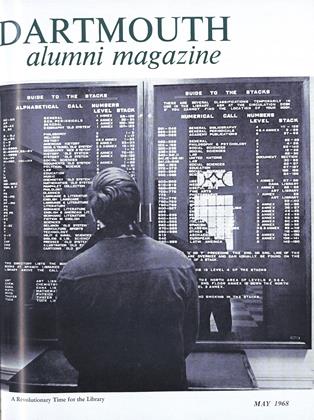As. editor of the new International Encyclopedia of the Social Sciences (New York: Macmillan and the Free Press, 1968. 17 vols. $4.95) which devotes no less than 75 articles to the subject of statistics, David L. Sills '42 can contemplate these impressive statistics compiled during his seven-year direction of this monumental publishing job:
The lESS, initiated in the planning stage in 1955, contains over nine thousand pages and approximately eight million words. Its 1,716 signed articles are by 1,505 contributors ( a number of them Dartmouth alumni and faculty members) from 33 nations. Its pre-publication cost was $2 million. Its topics range from what Professor Sills, terms the "Big Six" sciences of human behavior (an- thropology, economics, history, political science, sociology, and psychology) through the "Little Four" (geography, law, psychiatry, and statistics). It is already being translated into Italian and will eventually be published in every major language.
The first edition of the Encyclopedia, published in 1935, has been made largely obsolete by contemporary developments in all the social sciences. Although the new edition stresses the analytical approach, Professor Sills in his introduction says, "It should be pointed out that in explaining human behavior the social sciences do not explain away man's ultimate need for mystery."
The speculation is that the Encyclopedia will be a major influence in the social sciences for more than a generation, or, as the publisher put it, "It will take people 30 years to catch up with this set."
The editor has been years ahead in the social sciences since his undergraduate days. Currently a fellow at Stanford University's Center for Advanced Study in the Behavioral Sciences, he received his M.A. from Yale in 1948 and his Ph.D. from Columbia in 1956. The years from 1947 to 1950 he spent as a research analyst in the Civil Information and Education branch of the U.S. occupation of Japan, years that produced his first book, The Japanese Village in Transition. He was a research associate in Columbia's Bureau of Applied Social Research from 1952 until 1961, when he spent a year in Bombay with the United Nations Technical Assistance Organization. He returned to Columbia in 1962 for another five years, and has been at Stanford since 1967. He is the author of The Volunteers: Means andEnds in a National Organization.
 View Full Issue
View Full Issue
More From This Issue
-
 Feature
FeatureThe Making of a Primary Winner
May 1968 By WINTHROP A. ROCKWELL '70 -
 Feature
FeatureDartmouth's Alumni Relations
May 1968 -
 Feature
FeatureThe Library Revolution
May 1968 By Clifford L. Jordan '45 -
 Article
ArticleOxford Revisited
May 1968 By JOHN G. GARRARD, -
 Article
ArticleThe Undergraduate Chair
May 1968 By JOHN BURNS '68 -
 Class Notes
Class Notes1941
May 1968 By EARL H. COTTON, ROBERT G. THOMAS








